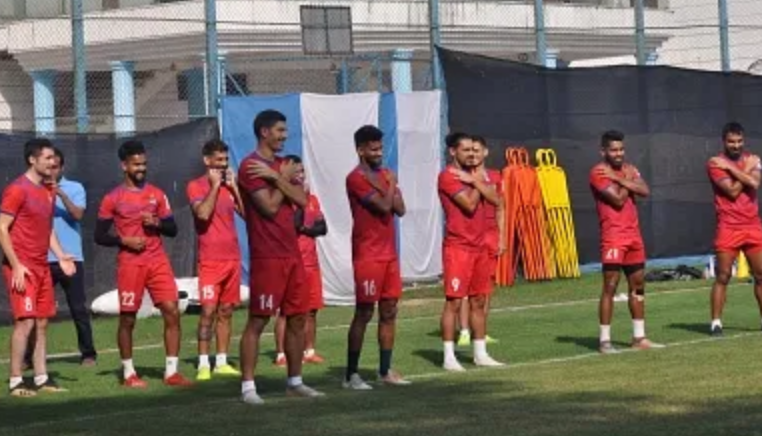AIFF Gets to Hide Behind Covid-19 Pandemic While Footballers Rust and Wither Away

ATK players during a training session. Players in the Indian Super League (ISL), with just 10 teams in the fray, are match starved and the lack of match time will affect their overall development, and thereby that of Indian football, in the long run.
The Republic of Burundi is a tiny landlocked African nation bordered by Rwanda, Tanzania and Congo. By the middle of May, the country recorded 42 cases of Covid-19. Some felt the worst was yet to come.
The government of Burundi, however, was of a different mindset and went ahead with the general elections on May 20. The Football Federation of Burundi too continued as normal playing out its 30-round Premier League with 16 teams in the regular home-and-away format.
While the decision to continue with the game was unexpected, the number of teams in Burundi, a country with a population of 12 million, did not come as a surprise. Most football leagues in Africa and Asia have 12 to 16 teams in the top tier.
On the Asian circuit, Indonesia’s Liga 1 has 18 teams, the Saudi professional league has 16. Nearer home, Bangladesh and Sri Lanka’s top divisions have 13 teams each. India, whose roadmap was unwrapped with pomp and gaiety in Kuala Lumpur last year, remains one of the few exceptions.
India has only 10 teams in the top league, the Indian Super League (ISL); its leading footballers hardly get to play 20-25 matches in a season. Under the new arrangement, the champions of India’s new league will straightaway play the Asian Champions League (ACL) this season.
All India Football Federation (AIFF) officials say that playing a minimum of 27 matches on the domestic circuit is a criteria every club has to fulfill to play the prestigious ACL. Here Covid 19 has come to India’s rescue – at least for the upcoming season!
In the AIFF executive committee meeting held earlier this month, the federation decided to approach the Asian Football Confederation (AFC) requesting an exemption. “We will write to AFC pointing out difficulties in fulfilling the 27-match criteria because of the shortened season. We are confident the parent body will see reason and grant an exemption,” an AIFF official said.
Fair enough. But a statement from national coach Igor Stimac a few days later exposed the other side of the game.
“We were also in touch with FSDL (AIFF’s marketing partners) to increase the length of the season, to have a long-term calendar, and the need to restructure the Durand Cup and the Super Cup,” said Stimac.
Read More | The Business of Football is More Important Than Football Itself
“Going forward, what will be crucial is the number of games. We cannot stop our season at the end of February and football needs to be played until mid-May. I am told that it cannot happen as it overlaps with the broadcast of the IPL, but broadcast is not important, what is important is that players play more games and bring more quality to the national team,” Stimac added.
Previously, some of Stimac’s utterances had caused embarrassment to the federation. This is the latest salvo. But by now, the Croat should be smart enough to realise there is no point using AIFF as a punching bag. He has spent considerable time in India and must be aware that the Indian federation, led by Praful Patel and his executives, have no control whatsoever over India's top league.
The bosses of India’s top league knock the AIFF’s doors only when they need to settle a problem. They are powerful enough to be obliged promptly. For the rest, they are on their own, doing things strictly on their own terms.
In 2019, Patel and his men turned Indian football upside down to snatch away the country’s top league status from I-League and hand it over to the franchise league. It came with attractive parks – a berth in the ACL, the spot earlier reserved for the I-League. The changeover was done ceremoniously – in Delhi and KL, followed by meetings, timely speeches and carefully worded press releases.
Read More | IOA and Ministry’s Quid Pro Quo Games An Embarrassment for Indian Sport
Nobody had the time to discuss the ‘minor’ issues. Like how to expand the shrinking domestic circuit with immediate effect. Or increase the number of teams and reduce the quota of foreign footballers. So, when the suggestion came that teams will meet each other thrice instead of twice, everyone lapped it up. Gleefully. Now our footballers will get to play 27 matches in a season – a perfect solution to beat the regulation at the continental level.
It reminds one of the situation in Indian football during the turn of the century. The domestic season was jam-packed and clubs were hopping from one centre to another to play in front of sell out crowds. There were complaints about footballers being overworked.
As the noise got louder, AIFF came up with a novel plan. They issued 45 tokens each to around 50 top footballers across the country. A player was supposed to hand over one token before playing a game. Once the player’s tokens were exhausted, he had to sit out. The idea was not to allow a footballer to play more than 45 matches a season – a stark contrast to the present day scenario.
Read More | Right To Play: The Unsuspecting Casualty of a Pandemic
Former India goalkeeper Subroto Paul once told this correspondent: “I played 120 or more matches in the first three seasons of my career. Now we struggle to find even 25 competitive matches in a domestic season. This is doing no good to Indian football.”
Let’s examine a report submitted by a couple of FIFA, AFC officials on February 17, 2018. It dealt with a possible roadmap of Indian domestic football.
The two signatories at the end of the report were Alex Phillips, Head of Asia Europe Affairs, AFC and Nic Coward, Professional Football Consultant, FIFA.
It said: “Unified national Tier 1 system to start with 12 teams in 2019-20. At the conclusion of the 2019-20 season, two additional teams to be added to Tier 1, so that there are 14 clubs in the 2020-21 season...”
The 17-page report further said the Tier 1 will be increased to 16 teams in the 2021-22 season. It also talked about the launch of a new unified system in the 2019-20 season. No wonder the report was kept on hold for more than a year before being discarded summarily. After all, it could have ruffled some feathers.
Reports will pile up and gather dust. Coaches will cry hoarse and leave once their contractual period is over. The length of Indian domestic season will get shorter – top footballers will continue to play a maximum of 25 competitive matches between May and April next year. Because those who run the show have left their bow and arrows home.
Get the latest reports & analysis with people's perspective on Protests, movements & deep analytical videos, discussions of the current affairs in your Telegram app. Subscribe to NewsClick's Telegram channel & get Real-Time updates on stories, as they get published on our website.
























